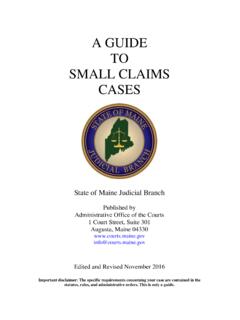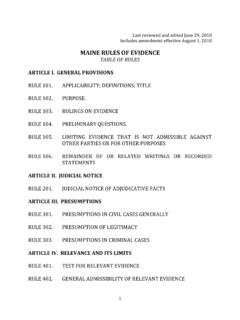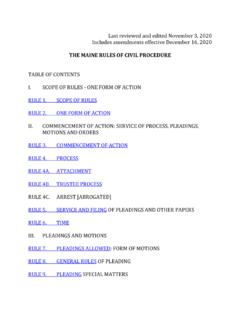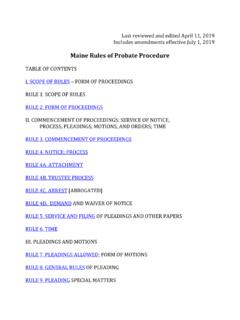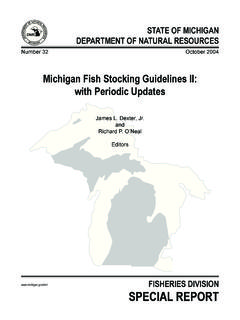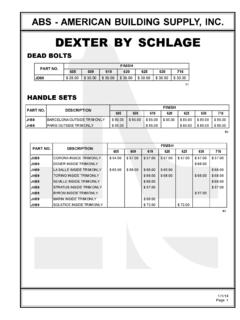Transcription of PATRICIA MAE VOTER DEXTER R. VOTER HJELM, J.
1 MAINE SUPREME JUDICIAL COURT Reporter of Decisions Decision: 2015 ME 11 Docket: Pis-14-72 Submitted On Briefs: October 27, 2014 Decided: January 29, 2015 Panel: SAUFLEY, , and ALEXANDER, MEAD, JABAR, and HJELM, JJ.* PATRICIA MAE VOTER v. DEXTER R. VOTER HJELM, J. [ 1] When PATRICIA Mae VOTER and DEXTER R. VOTER divorced in 2006 after twenty-seven years of marriage, the divorce judgment required DEXTER to pay PATRICIA general spousal support of $1,300 per month until he retired, when the amount of support would become 1/2 of his retirement earnings. After DEXTER retired in 2013, he filed a post-judgment motion to modify the amount of his spousal support obligation. The District Court (Dover-Foxcroft, Stitham, J.) issued an order clarifying the meaning of retirement earnings, and then, after a testimonial hearing, denied the motion to modify. DEXTER appeals those orders, and we affirm.
2 * Silver, J., participated in the initial conference but retired before this opinion was adopted. 2 I. BACKGROUND [ 2] PATRICIA and DEXTER s divorce in October 2006 was uncontested. The divorce judgment made reference to the parties written settlement agreement, which provided for spousal support and the disposition of real and personal property. The judgment required DEXTER to pay spousal support as follows: The Defendant [ DEXTER ] shall pay the Plaintiff [ PATRICIA ] as general spousal support $1, a month starting 10/15/06 and the 15th of each month thereafter until the first of the following to occur: 1. the Plaintiff re-marries, or; 2. the Defendant retires. In the event that on the date that the Defendant retires the Plaintiff has not re-married, then the Defendant shall on a monthly basis, pay the Plaintiff as general spousal support 1/2 of his retirement earnings until the Plaintiff re-marries.
3 PATRICIA has not remarried and therefore remains entitled to receive support pursuant to the judgment. [ 3] DEXTER was employed by the United States Postal Service (USPS) until he became disabled and stopped working in April 2013. He then began to receive Social Security Disability (SSD) benefits and retirement benefits from the USPS. Additionally, he receives retirement benefits from the United States Air Force (USAF) and rental income from a house he owns, which is occupied by the son of his present wife. He also expects to receive Social Security benefits when he reaches the age of sixty-five. 3 [ 4] In May 2013, DEXTER filed a motion to modify the amount of his spousal support obligation pursuant to 19-A 951(4) (2014), alleging a change of circumstances because he is no longer employed. At a case management conference on the motion, both parties agreed that the court would issue an order clarifying the term retirement earnings as it appears in the judgment.
4 In October 2013, a non-testimonial hearing was held, where DEXTER contended that only money earned during retirement, such as the rental income, should be considered retirement earnings, while PATRICIA argued that spousal support should be based on all categories of income that DEXTER received during retirement, including his SSD benefits and his USPS and USAF retirement benefits. The court issued a written order clarifying the judgment by defining retired and retirement earnings, as used in the judgment, as follows: The Defendant shall be considered to be retired when he ceases to be regularly employed for whatever reason. Retirement earnings consist of all monies paid to or received by the Defendant. This would include but not be limited to: his Social Security, Social Security disability, postal retirement, military retirement, rental income, and monies received for any of his labor.
5 [ 5] In January 2014, a testimonial hearing was held on DEXTER s motion to modify. There, DEXTER argued that his support obligation should either be 4 terminated altogether or reduced to a monthly payment of $ Following the hearing, the court issued a written decision denying DEXTER s motion. The court found that PATRICIA s annual income, including the spousal support that DEXTER was required to pay, was approximately $29,000 and that without spousal support, her only source of income was Social Security, which amounted to less than $9,000 annually. At the time of the hearing, she was seventy-five years old and lived in subsidized housing for the elderly. DEXTER , who was sixty-two years old at the time of the hearing, received more than $51,000 annually from retirement and disability benefits and rental income. He had remarried, and his new wife received annual retirement benefits of $20,000.
6 The court concluded that the amount of spousal support required by the judgment was both necessary to maintain a reasonable standard of living for PATRICIA and within DEXTER s financial capability. 1 The record does not reveal why DEXTER argued that support should be reduced to this particular amount as an alternative to termination of support. 5 [ 6] DEXTER filed a timely appeal from the court s He contends that the court erred by construing retirement earnings too broadly and by denying his motion to modify his support II. DISCUSSION A. Clarification of the Judgment [ 7] DEXTER first argues that the court erred by clarifying the spousal support provisions of the judgment and, as part of that clarification, by construing retirement earnings to include income in addition to his USPS and USAF retirement 2 PATRICIA argues that DEXTER s appeal was untimely because it was not filed within 21 days of the date the court issued its clarification order.
7 See App. P. 2(b)(3). The parties, however, treated the clarification issue as a component of the motion to modify. Consequently, an appeal from the clarification order would have been interlocutory because the motion to modify had not been fully adjudicated. See Civ. P. 54(b)(1). 3 After the court denied DEXTER s motion to modify, PATRICIA filed a motion to enforce the support obligation. Following a hearing held in May 2014, the court granted the motion, finding that DEXTER was in arrears simply [because of] his failing to budget realistically and choices that needlessly impair his ability to keep current in the support payments owed to PATRICIA . The court entered judgment against DEXTER for the amount of the arrearage and attorney fees, and ordered that income be withheld from his SSD benefits and his USAF and USPS retirement payments. DEXTER has not appealed that order.
8 4 This appears to be a different argument than the one DEXTER made to the trial court. There, DEXTER argued that only money actually earned during retirement ( his rental income) should be considered retirement earnings, but then said at the very height the definition might also include his USPS retirement benefits. On appeal, he argues that the trial court erroneously expanded the definition of retirement earnings to include Social Security benefits, rental income, and labor, rather than just income that he had coming to him from his various retirement plans and pensions. Therefore, because he has changed his position regarding whether his rental income, income from other labor, and USPS and USAF benefits should be included in the definition of retirement earnings, his only consistent argument is that Social Security benefits should be excluded from that term.
9 Because we affirm the court s clarification order on its merits, however, we need not reach the question of whether DEXTER preserved his argument that income and benefits other than Social Security should be excluded from the definition of retirement earnings. 6 [ 8] In order to determine whether the court s clarification of the divorce judgment was erroneous, we use a two-part test. First, we determine whether the prior judgment was ambiguous as a matter of law. Thompson v. Rothman, 2002 ME 39, 6, 791 921 (quotation marks omitted). This is a de novo determination that centers on whether the language at issue is reasonably susceptible to different interpretations. Burnell v. Burnell, 2012 ME 24, 6, 40 390 (quotation marks omitted). If the judgment is ambiguous, then the court has the inherent and continuing authority to clarify the judgment, MacDonald v.
10 MacDonald, 582 976, 977 (Me. 1990), and we consider, using an abuse of discretion standard, whether the clarification is consistent with its language read as a whole and is objectively supported by the record. Thompson, 2002 ME 39, 6-7, 791 921. Where, as here, the judge who clarified the judgment is also the judge who initially issued the judgment, we give particular deference to the clarification because it is the intention of the court that issued the judgment originally that is controlling. Id. 8. [ 9] Here, for two reasons, the court did not err in issuing the order clarifying the judgment. First, because DEXTER agreed that the court should issue an order clarifying the meaning of retirement earnings, he has waived his contrary argument that it was improper for the court to issue an order of clarification. See Foster v. Oral Surgery Assocs., , 2008 ME 21, 22, 940 1102.



